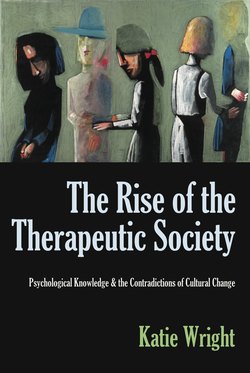Читать книгу The Rise of the Therapeutic Society: Psychological Knowledge & the Contradictions of Cultural Change - Katie Wright - Страница 6
На сайте Литреса книга снята с продажи.
1 The Therapeutic Society & Its Discontents
ОглавлениеA cultural revolution does not occur as a discernible event, or as a plurality of events, nor does it occur swiftly within a few years, as does a political revolution; only afterwards, when the revolution itself has been incorporated into the new system of controls, do such mythic condensations of cultural change occur.
—Philip Rieff, 1966
For close to half a century, social scientists and cultural analysts have lamented the increasing influence of psychology, the rise of therapy and counseling, and an associated preoccupation with the self and internal life. From a variety of intellectual traditions and theoretical standpoints, it has been widely argued that the ascendancy of a modern therapeutic ethos has been a pernicious development, inciting cultural decline, a narcissistic concern with the self, and leading to the rise of a so-called victim culture. Philip Rieff's influential reading of the deterioration of social and cultural life is predicated upon an interpretation of the therapeutic as remissive, that is, that it has ushered in an era of unprecedented lack of constraint and a concomitant diminishment of dignified conduct.1 In contrast, analyses emphasizing the capitalist political economy, as well as those following Michel Foucault, advance alternative critiques of psychological knowledge and therapeutic practices as highly bound up with modern forms of social control and regulation.2
This chapter examines social theoretical readings of the therapeutic turn, beginning with Rieff's pioneering analysis of "faith after Freud," which has informed a diversity of standpoints. Christopher Lasch, for example, shared his moral conservatism but added a political critique, arguing that the therapeutic had incited a turn away from politics and social engagement towards a preoccupation with self-improvement and personal fulfillment. James Nolan examined its institutionalization within the apparatus of the modern state, and argued that the therapeutic is deployed as a moralizing discourse that justifies and legitimates the operations of government. More recently Frank Furedi has elaborated concerns about the ascendancy of the emotional realm and the cultivation of vulnerability, situating his analysis of the therapeutic within contemporary debates about the amplification of risk.3
During the four decades between Rieff's seminal treatise and Furedi's contemporary exposition, debate has shifted as the intellectual climate has changed. Rieff's analysis reflected postwar concerns, that of Lasch the cultural and economic transitions of the late 1960s and 1970s, Nolan's the therapeutic authority secured by century's end, while Furedi's account of "therapy culture" reflects the growing cultural influence of therapy and counseling in the contemporary climate of economic, political, and personal uncertainty.
From the Rieffian story of moral collapse to Marxist interpretations of capitalist control, Foucauldian analyses of disciplinary discourses, and feminist objections to therapy, there is widespread consensus that the ascendancy of the therapeutic has been deleterious to sociocultural, political, and personal life. As insightful as these approaches are, a critical analysis suggests that they have nevertheless inadequately theorized the complex and contradictory dimensions of the therapeutic society.4 Drawing on recent directions in social theory, I propose an alternative framework for theorizing by way of a reinterpretation of the changing nexus between internalized cultural authority, the weakening of the division between the public and private spheres, and changes in family life and intimate relationships. These developments, all of which involve gendered social processes, underpin the reflexive culture of late modernity. Attention to them at the conceptual level, and exploration of their historical manifestation in the Australian context, throws light on important dimensions of the therapeutic society, especially those associated both with the struggles of ordinary people in dealing with changing social conditions, and with increased social recognition of forms of emotional suffering which had hitherto largely been hidden. To contextualize these concerns, I turn first to the theoretical accounts that have shaped understandings of the therapeutic over the last several decades.
